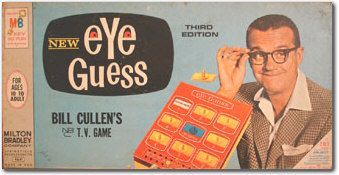Eye Guess (1966) Board Game
Eye Guess is a board game released in 1966 by Milton Bradley. It is a game that combines elements of memory, trivia, and TV game shows, making it a fun and engaging experience for players of all ages. The game is centered around guessing the correct answers to various questions related to movies, TV, and radio themes.
Game Components of Eye Guess
How To Setup Eye Guess
To set up the game, players need to place the game board in the middle of the playing area. Each player chooses a token and places it on the starting position on the board. The question and answer cards are shuffled and placed within reach of all players. The timer is set to ensure the 8-second time limit for each round.
Gameplay Mechanics and Game Objective
– Players take turns drawing question cards.
– The player shows the answer cards for eight seconds.
– The player must then guess the correct number corresponding to the answer they think is correct.
– Points are awarded for correct guesses.
– The game continues until a player reaches a predetermined number of points, winning the game.
Player Experience
Playing Eye Guess is a fast-paced and engaging experience that tests players’ quick thinking and memory skills. The short time frame to view the answers adds an element of pressure, making it both exhilarating and challenging. The game is simple to understand but difficult to master, which can lead to intense competition among players.
Pros
Cons
Personal Thoughts on Eye Guess
Eye Guess is perfect for families, casual game nights, or anyone looking for a quick, fun, and mentally stimulating game. It’s ideal for those who enjoy trivia and guessing games, and its simplicity makes it accessible to a wide range of ages. However, players seeking more complex or strategic games might find Eye Guess a bit too straightforward.
We are supported by our audience. When you purchase through links on our site, we may earn an affiliate commission, at no extra cost for you. Learn more.

